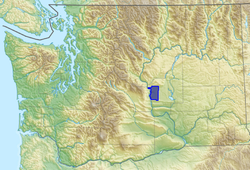| Wine region | |
 | |
| Type | American Viticulture Area |
|---|---|
| Year established | 2012[1] |
| Country | United States |
| Part of | Washington, Columbia Valley AVA |
| Other regions in Washington, Columbia Valley AVA | Candy Mountain AVA, Goose Gap AVA, Horse Heaven Hills AVA, Naches Heights AVA, Lake Chelan AVA, Rattlesnake Hills AVA, Red Mountain AVA, Rocky Reach AVA, Royal Slope AVA, Snipes Mountain AVA, The Burn of Columbia Valley AVA, Wahluke Slope AVA, Walla Walla Valley AVA, White Bluffs AVA, Yakima Valley AVA |
| Growing season | 182 days |
| Precipitation (annual average) | 6 inches (152 mm)[2] |
| Soil conditions | Fine sand, very fine sandy loam, silt loam and loamy fine sand[2] |
| Total area | 162,762 acres (254 sq mi)[1] |
| Size of planted vineyards | 1,604 acres (649 ha)[1][3] |
| No. of vineyards | 6[1][2] |
| Grapes produced | Riesling, Pinot Gris, Chardonnay, Syrah, Merlot[2][4] |
| No. of wineries | 6[1][2] |
Ancient Lakes of Columbia Valley, also locally called "Ancient Lakes", is an American Viticultural Area {AVA) which lies on the western edge of the Columbia Basin near the town of Quincy in Douglas, Grant, and Kittitas Counties in the state of Washington. The appellation lies entirely within the vast Columbia Valley viticultural area and was established on November 19, 2012, as the state's 13th AVA, by the Alcohol and Tobacco Tax and Trade Bureau {TTB), Treasury. The petition was received by TTB from Joan R. Davenport, a professor of soil sciences at Washington State University, and Cameron Fries of White Heron Cellars, on behalf of the vintners and grape growers in the Ancient Lakes region in central Washington, proposing the establishment of the "Ancient Lakes of Columbia Valley" viticultural area.[1]
Geography[edit]

Lying between the Beezley Hills to the North and the Frenchman Hills to the south, the growing region was severely impacted by the immense water flows of the Missoula floods. The scouring effect of the waters stripped the top soils down to the basalt and scoured out canyons referred to locally as "coulees" which are prominent features near many of the planted vineyards.[5] The Columbia River forms the western border of the grape growing region.
Soils[edit]
Basalt and caliche rock are unique in their prominence of the soils in the grape growing areas. Missoula floods scoured the area stripping the original top soils along the western edge of the Quincy valley. Large standing pools of water left by the floods created thick deposits of caliche that lay over the basalt. With time, both rock types have fractured and are prominent in the soils. Quincy loam and windblown loess soils lay over the rocks.
Climate[edit]
The growing region lies close to the easternmost foothills of the Cascade Mountain range. A strong rain shadow effect gives the area one of the lowest precipitation rates[6] in the Columbia Valley.
Grape growing[edit]
Deep in the heart of Washington Wine country, white wine grapes represent the bulk of the grape plantings in the growing region and are planted on the higher elevations (avg. 1200–1500') along the Beezley Hills and the Evergreen and Babcock ridges.
White Riesling, Chardonnay, and Pinot Gris are dominant plantings along with red varieties used for rosé-style wines
Red wine varieties are planted in close proximity to the Columbia River along the benches and exposed basalt cliffs formed by the "cataract effects" of the Missoula floods. This area lies at a lower elevation and is considerably warmer, lending itself to red wine grape production including Syrah, Merlot and others.
Vineyards[edit]
- Cave B- Familigia Vineyards
- Jones of Washington
- Evergreen Vineyards
- Ryan Patrick Vineyards
- Spanish Castle Vineyards
- White Heron Cellars
References[edit]
- ^ a b c d e f "Establishment of the Ancient Lakes of Columbia Valley Viticultural Area" (27 CFR 9 [Docket No. TTB–2012–0003; T.D. TTB–108; Ref: Notice No.128] RIN 1513–AB85 Final Rule). Federal Register. 77 (202). Alcohol and Tobacco Tax and Trade Bureau {TTB), Treasury: 64033–64036. October 18, 2012. Archived (PDF) from the original on April 18, 2023. Retrieved February 4, 2016.
 This article incorporates text from this source, which is in the public domain.
This article incorporates text from this source, which is in the public domain.
- ^ a b c d e "Ancient Lakes of Columbia Valley (AVA): Appellation Profile". Appellation America. 2012. Archived from the original on June 8, 2023. Retrieved March 4, 2024.
- ^ "Ancient Lakes of Columbia Valley". Washington State Wine. 2014. Archived from the original on September 25, 2023. Retrieved January 4, 2017.
- ^ "Ancient Lakes of Columbia Valley Wine". Wine-Searcher. April 28, 2014. Archived from the original on August 15, 2021. Retrieved May 24, 2020.
- ^ Bjornstad, Bruce N. (May 1, 2006). On the Trail of the Ice Age Floods: A Geological Field Guide to the Mid-Columbia Basin. Sandpoint, Idaho: Keokee Books. p. 2. ISBN 978-1-879628-27-4.
- ^ "Climate Quincy – Washington". US Climate Data. Retrieved February 4, 2016.
